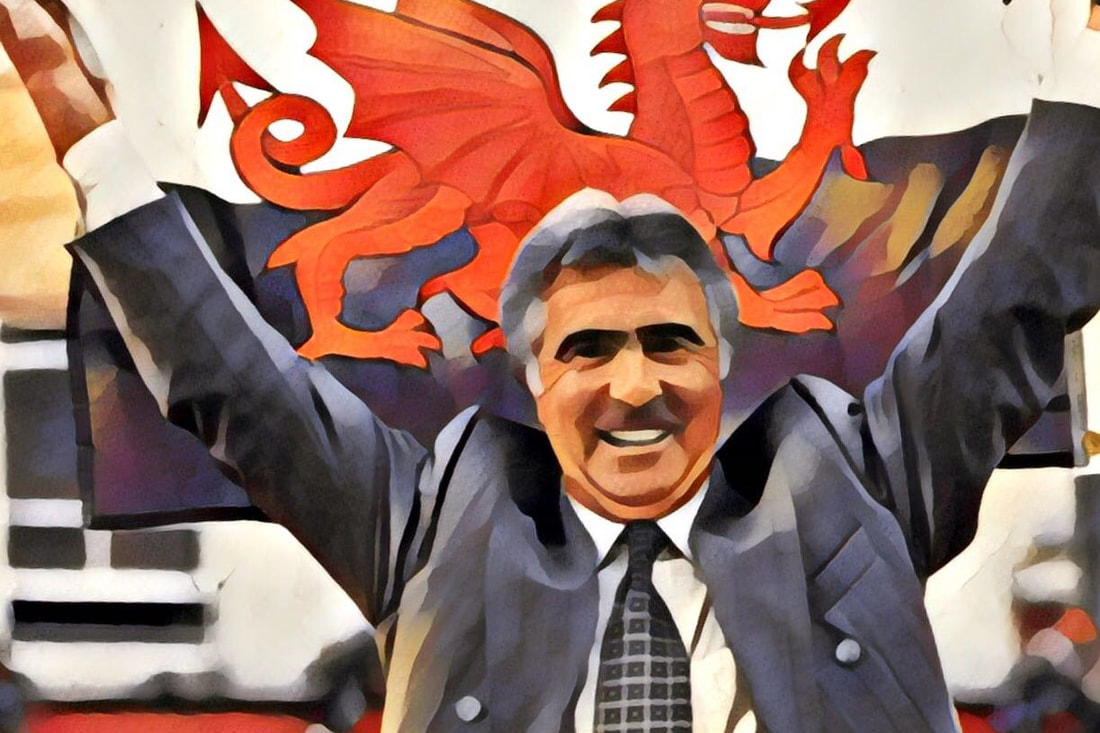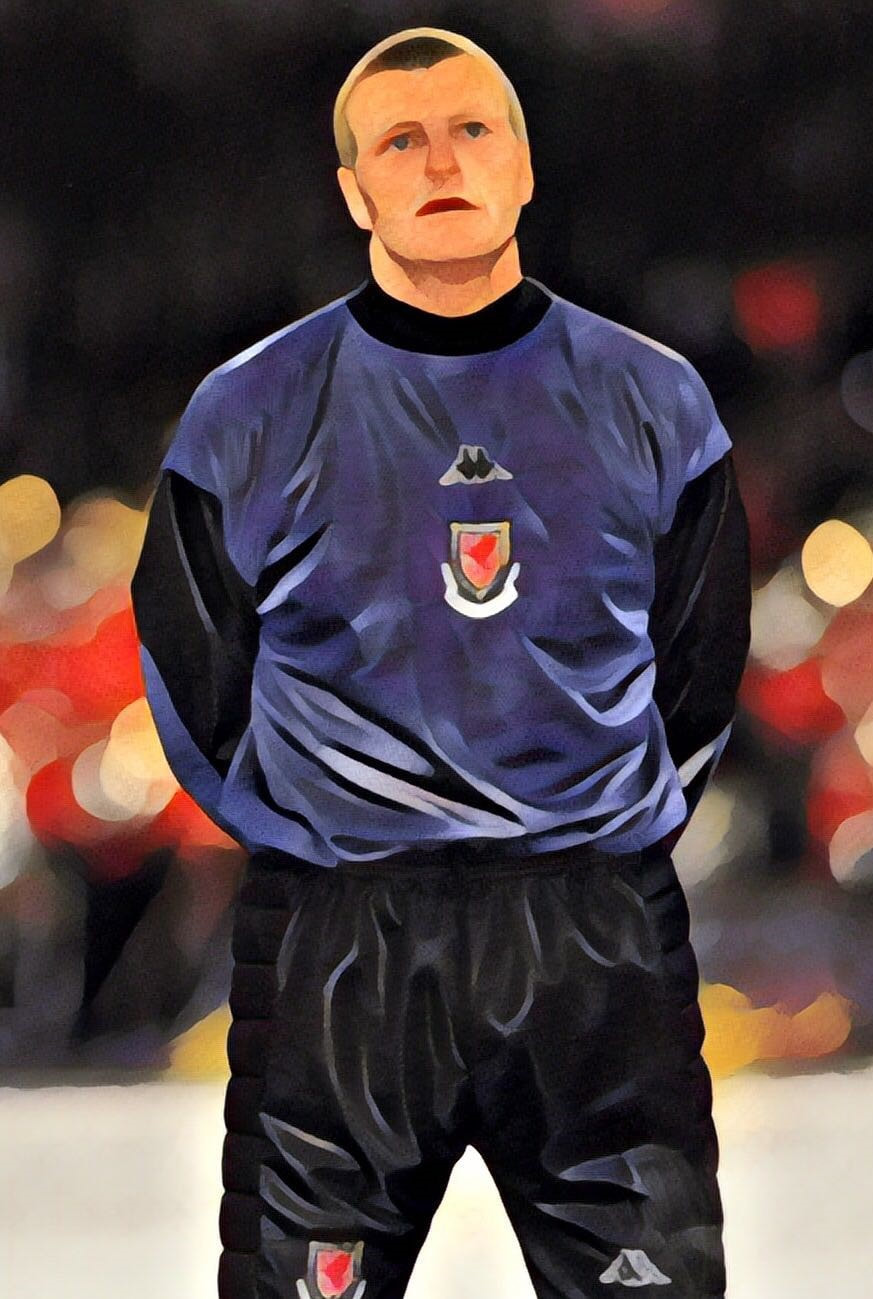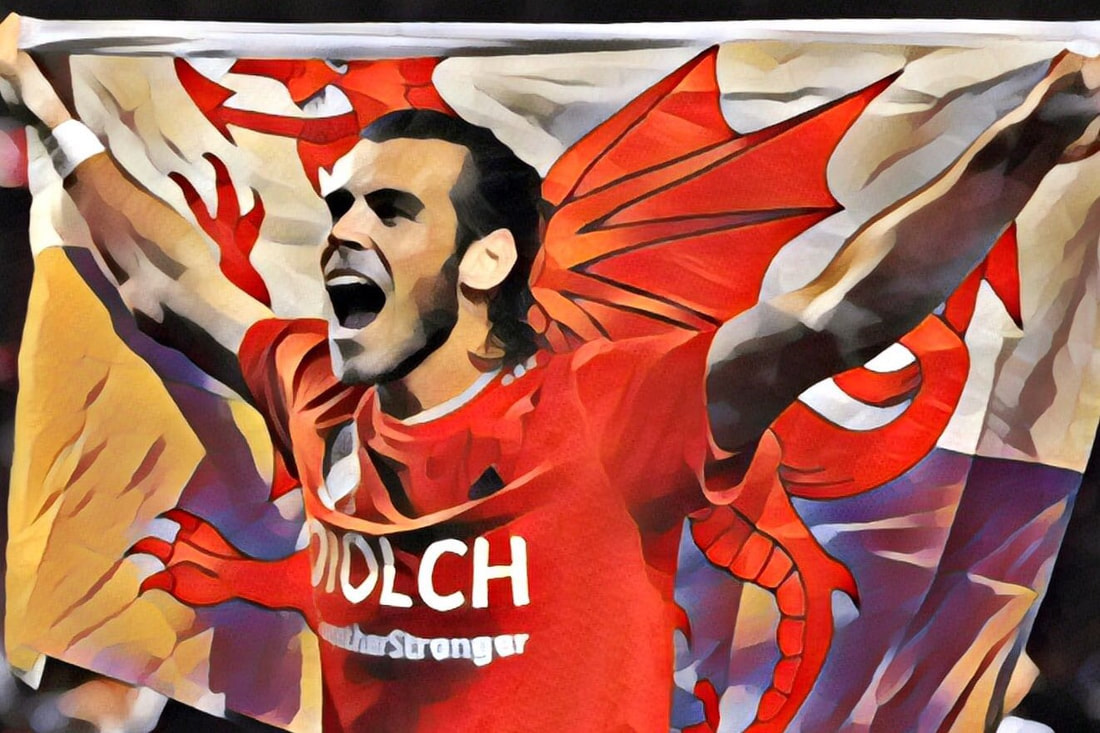When Roger Freestone Played for Wales
First read at 'The Blues Are on the Edge of Their Seats' – a Euro 2016 warm-up event held at Chapter Arts Centre, Cardiff on 9th June 2016.
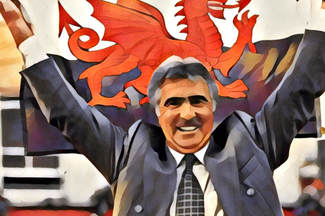
The first Wales team I watched was lead by Bobby Gould, a man who looked like he would be more at home running a bar on the Costa Del Sol than managing the likes of Ryan Giggs and Gary Speed. Sometimes looks can be deceiving, but not in this case. Wales under Gould were awful, a laughing stock. In addition to a 7–1 thumping by a Dennis Bergkamp-inspired Dutch side, Gould’s Wales also lost 2–1 to Leyton Orient in a friendly. Leyton. Orient. Those juggernauts of club football, who – when a pretty strong Wales side faced them in May 1996 – had just finished 89th out of 92 in the English Football League.
With the Welsh team currently preparing to face Slovakia in their Euro 2016 opening game on Saturday, perhaps we can finally look back at Bobby Gould’s reign as Wales boss and laugh. They were dark days, and thankfully such a contrast to the feeling surrounding the team at this particular moment in time. But for me, enduring the tenure of Bobby Gould was the ultimate preparation for life as a Wales fan – a life which has been, until very recently, a seemingly constant cycle of crushing lows and false dawns.
When Wales returned to using a national stadium for their games in the year 2000 – after three years of sleeping on the sofa at Cardiff’s Ninian Park, Wrexham’s Racecourse and, embarrassingly, Liverpool’s Anfield (in England) – it felt like a fresh start. By the time Finland arrived in town for the first football international at the newly-built Millennium Stadium, Bobby Gould was gone – replaced by Mark Hughes, a Welsh legend who was still playing club football at Southampton. Hughes had won his first match as permanent Wales boss in a friendly played out in the searing heat of Qatar, but his first game on home soil was a sign of things to come. A 2–1 friendly defeat against Finland in Cardiff would begin a run of 12 games – 7 of them at the Millennium Stadium – without a win. New home, new manager, same old Wales.
However, results had been deceiving. It was clear that Wales were becoming a different entity under Mark Hughes, and a 1–0 victory over Belarus in October 2001 kick-started a 10-game unbeaten run – a run which included that spectacular 2–1 defeat of Italy at the Millennium Stadium, and gave Wales a real chance of qualifying for the 2004 European Championships in Portugal. But we all know how that ended. After exploding into life during the first half of the qualifying campaign, Wales limped towards the finishing line, then faced Russia in the play-offs. A promising 0–0 draw in Moscow was followed by a devastating 1–0 defeat in Cardiff four days later. Another false dawn.
With the Welsh team currently preparing to face Slovakia in their Euro 2016 opening game on Saturday, perhaps we can finally look back at Bobby Gould’s reign as Wales boss and laugh. They were dark days, and thankfully such a contrast to the feeling surrounding the team at this particular moment in time. But for me, enduring the tenure of Bobby Gould was the ultimate preparation for life as a Wales fan – a life which has been, until very recently, a seemingly constant cycle of crushing lows and false dawns.
When Wales returned to using a national stadium for their games in the year 2000 – after three years of sleeping on the sofa at Cardiff’s Ninian Park, Wrexham’s Racecourse and, embarrassingly, Liverpool’s Anfield (in England) – it felt like a fresh start. By the time Finland arrived in town for the first football international at the newly-built Millennium Stadium, Bobby Gould was gone – replaced by Mark Hughes, a Welsh legend who was still playing club football at Southampton. Hughes had won his first match as permanent Wales boss in a friendly played out in the searing heat of Qatar, but his first game on home soil was a sign of things to come. A 2–1 friendly defeat against Finland in Cardiff would begin a run of 12 games – 7 of them at the Millennium Stadium – without a win. New home, new manager, same old Wales.
However, results had been deceiving. It was clear that Wales were becoming a different entity under Mark Hughes, and a 1–0 victory over Belarus in October 2001 kick-started a 10-game unbeaten run – a run which included that spectacular 2–1 defeat of Italy at the Millennium Stadium, and gave Wales a real chance of qualifying for the 2004 European Championships in Portugal. But we all know how that ended. After exploding into life during the first half of the qualifying campaign, Wales limped towards the finishing line, then faced Russia in the play-offs. A promising 0–0 draw in Moscow was followed by a devastating 1–0 defeat in Cardiff four days later. Another false dawn.
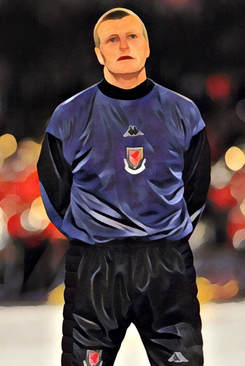
An excuse often given for the shortcomings of the Welsh national team is the absence of strength in depth. It’s not surprising, given that we are a nation of just over 3 million people, that we find it difficult to cobble together a team of world-beaters. A player with eight Premier League medals for his club side, for example, might find himself pulling on the red shirt alongside a fellow Welshman making a living in the lower leagues. The gulf in class between players in different divisions isn’t always apparent though, or even present – Danny Gabbidon and Rob Earnshaw were a crucial part of the team that almost made it to Euro 2004, despite playing for Cardiff in the third tier of English football at the time. But the Gabbidon and Earnshaw of that era are definitely the exception, not the rule, as they proved by going on to make over 200 Premier League appearances between them.
Rewinding back to 2000, Wales followed up that disappointing defeat against Finland with another Millennium Stadium friendly two months later. I watched the whole game stood next to the small portable TV in my kitchen. There must have been a particularly hyped-up episode of Coronation Street on that night, because it was unusual to be banished to another room in my house to watch football.
The kitchen portable didn’t have the best signal, but there was no way I was missing this match. Excitement for my 12-year-old self was threefold. First of all, Wales were hosting the mighty Brazil, albeit a Brazil without Roberto Carlos or the original Ronaldo. Secondly, someone in school had told me that Wales would be wearing a new kit made by Kappa, and a new kit reveal for a young football fan is about as thrilling as it can get without a ball being kicked or a sticker being swapped. Finally, Swansea City’s goalkeeper Roger Freestone – the Peter Schmeichel of the Vetch Field – was set to make his international debut.
Freestone deserved to be recognised. He had just almost single-handedly lifted the Swans out of the bottom tier of English football, keeping a club record 22 clean sheets during the 1999/2000 season. Brazil predictably outclassed Wales on the night, though Freestone and his defence managed to keep the scores level for just over an hour. The opening Brazilian goal came after the ball trickled into the path of Élber for a tap-in following a superb double save from Freestone, and then there was simply nothing a lower-league keeper could do to stop world-class finishes from Cafu and Rivaldo.
Rewinding back to 2000, Wales followed up that disappointing defeat against Finland with another Millennium Stadium friendly two months later. I watched the whole game stood next to the small portable TV in my kitchen. There must have been a particularly hyped-up episode of Coronation Street on that night, because it was unusual to be banished to another room in my house to watch football.
The kitchen portable didn’t have the best signal, but there was no way I was missing this match. Excitement for my 12-year-old self was threefold. First of all, Wales were hosting the mighty Brazil, albeit a Brazil without Roberto Carlos or the original Ronaldo. Secondly, someone in school had told me that Wales would be wearing a new kit made by Kappa, and a new kit reveal for a young football fan is about as thrilling as it can get without a ball being kicked or a sticker being swapped. Finally, Swansea City’s goalkeeper Roger Freestone – the Peter Schmeichel of the Vetch Field – was set to make his international debut.
Freestone deserved to be recognised. He had just almost single-handedly lifted the Swans out of the bottom tier of English football, keeping a club record 22 clean sheets during the 1999/2000 season. Brazil predictably outclassed Wales on the night, though Freestone and his defence managed to keep the scores level for just over an hour. The opening Brazilian goal came after the ball trickled into the path of Élber for a tap-in following a superb double save from Freestone, and then there was simply nothing a lower-league keeper could do to stop world-class finishes from Cafu and Rivaldo.
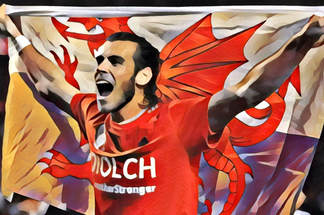
A 3–0 defeat never looks good on the defence, but I thought my Swans hero had played well. So when Notts County’s Darren Ward lined up in goal for Wales’s next match against Portugal a month later, I asked my stepfather why Freestone wasn’t playing. "Hughes is just using the friendlies to give the reserve keepers a game," he said, "Paul Jones will be back in goal for the qualifiers." I was devastated.
Overlooked for subsequent squads, Freestone’s international career would begin and end with that run out against Brazil. For many, he will forever be seen as an example of Wales’s crippling lack of strength in depth. I’ve heard many fans say things along the lines of "the problem with Wales is that it’s Ryan Giggs and Roger Freestone." Taking my black-and-white-tinted glasses off for a second, I’d say that’s a fair analysis.
But it also makes me realise the unique situation that the current Welsh squad finds itself in. For all the criticism of being a 'one-man team' they want to throw at us, it’s clear to see that there is genuine team spirit in that Welsh camp. Everyone is equal, regardless of their level – it doesn’t matter if you play for Real Madrid or Inverness Caledonian Thistle. Perhaps that’s why the stunning start to the last qualifying campaign didn’t turn out to be yet another false dawn. I won’t hold my breath, but maybe – just maybe – the dark days of Welsh international football, with their crushing lows, false dawns and dodgy managers, are behind us for good.
Overlooked for subsequent squads, Freestone’s international career would begin and end with that run out against Brazil. For many, he will forever be seen as an example of Wales’s crippling lack of strength in depth. I’ve heard many fans say things along the lines of "the problem with Wales is that it’s Ryan Giggs and Roger Freestone." Taking my black-and-white-tinted glasses off for a second, I’d say that’s a fair analysis.
But it also makes me realise the unique situation that the current Welsh squad finds itself in. For all the criticism of being a 'one-man team' they want to throw at us, it’s clear to see that there is genuine team spirit in that Welsh camp. Everyone is equal, regardless of their level – it doesn’t matter if you play for Real Madrid or Inverness Caledonian Thistle. Perhaps that’s why the stunning start to the last qualifying campaign didn’t turn out to be yet another false dawn. I won’t hold my breath, but maybe – just maybe – the dark days of Welsh international football, with their crushing lows, false dawns and dodgy managers, are behind us for good.
The first Wales team I watched was lead by Bobby Gould, a man who looked like he would be more at home running a bar on the Costa Del Sol than managing the likes of Ryan Giggs and Gary Speed. Sometimes looks can be deceiving, but not in this case. Wales under Gould were awful, a laughing stock. In addition to a 7–1 thumping by a Dennis Bergkamp-inspired Dutch side, Gould’s Wales also lost 2–1 to Leyton Orient in a friendly. Leyton. Orient. Those juggernauts of club football, who – when a pretty strong Wales side faced them in May 1996 – had just finished 89th out of 92 in the English Football League.
With the Welsh team currently preparing to face Slovakia in their Euro 2016 opening game on Saturday, perhaps we can finally look back at Bobby Gould’s reign as Wales boss and laugh. They were dark days, and thankfully such a contrast to the feeling surrounding the team at this particular moment in time. But for me, enduring the tenure of Bobby Gould was the ultimate preparation for life as a Wales fan – a life which has been, until very recently, a seemingly constant cycle of crushing lows and false dawns.
When Wales returned to using a national stadium for their games in the year 2000 – after three years of sleeping on the sofa at Cardiff’s Ninian Park, Wrexham’s Racecourse and, embarrassingly, Liverpool’s Anfield (in England) – it felt like a fresh start. By the time Finland arrived in town for the first football international at the newly-built Millennium Stadium, Bobby Gould was gone – replaced by Mark Hughes, a Welsh legend who was still playing club football at Southampton. Hughes had won his first match as permanent Wales boss in a friendly played out in the searing heat of Qatar, but his first game on home soil was a sign of things to come. A 2–1 friendly defeat against Finland in Cardiff would begin a run of 12 games – 7 of them at the Millennium Stadium – without a win. New home, new manager, same old Wales.
However, results had been deceiving. It was clear that Wales were becoming a different entity under Mark Hughes, and a 1–0 victory over Belarus in October 2001 kick-started a 10-game unbeaten run – a run which included that spectacular 2–1 defeat of Italy at the Millennium Stadium, and gave Wales a real chance of qualifying for the 2004 European Championships in Portugal. But we all know how that ended. After exploding into life during the first half of the qualifying campaign, Wales limped towards the finishing line, then faced Russia in the play-offs. A promising 0–0 draw in Moscow was followed by a devastating 1–0 defeat in Cardiff four days later. Another false dawn.
With the Welsh team currently preparing to face Slovakia in their Euro 2016 opening game on Saturday, perhaps we can finally look back at Bobby Gould’s reign as Wales boss and laugh. They were dark days, and thankfully such a contrast to the feeling surrounding the team at this particular moment in time. But for me, enduring the tenure of Bobby Gould was the ultimate preparation for life as a Wales fan – a life which has been, until very recently, a seemingly constant cycle of crushing lows and false dawns.
When Wales returned to using a national stadium for their games in the year 2000 – after three years of sleeping on the sofa at Cardiff’s Ninian Park, Wrexham’s Racecourse and, embarrassingly, Liverpool’s Anfield (in England) – it felt like a fresh start. By the time Finland arrived in town for the first football international at the newly-built Millennium Stadium, Bobby Gould was gone – replaced by Mark Hughes, a Welsh legend who was still playing club football at Southampton. Hughes had won his first match as permanent Wales boss in a friendly played out in the searing heat of Qatar, but his first game on home soil was a sign of things to come. A 2–1 friendly defeat against Finland in Cardiff would begin a run of 12 games – 7 of them at the Millennium Stadium – without a win. New home, new manager, same old Wales.
However, results had been deceiving. It was clear that Wales were becoming a different entity under Mark Hughes, and a 1–0 victory over Belarus in October 2001 kick-started a 10-game unbeaten run – a run which included that spectacular 2–1 defeat of Italy at the Millennium Stadium, and gave Wales a real chance of qualifying for the 2004 European Championships in Portugal. But we all know how that ended. After exploding into life during the first half of the qualifying campaign, Wales limped towards the finishing line, then faced Russia in the play-offs. A promising 0–0 draw in Moscow was followed by a devastating 1–0 defeat in Cardiff four days later. Another false dawn.
An excuse often given for the shortcomings of the Welsh national team is the absence of strength in depth. It’s not surprising, given that we are a nation of just over 3 million people, that we find it difficult to cobble together a team of world-beaters. A player with eight Premier League medals for his club side, for example, might find himself pulling on the red shirt alongside a fellow Welshman making a living in the lower leagues. The gulf in class between players in different divisions isn’t always apparent though, or even present – Danny Gabbidon and Rob Earnshaw were a crucial part of the team that almost made it to Euro 2004, despite playing for Cardiff in the third tier of English football at the time. But the Gabbidon and Earnshaw of that era are definitely the exception, not the rule, as they proved by going on to make over 200 Premier League appearances between them.
Rewinding back to 2000, Wales followed up that disappointing defeat against Finland with another Millennium Stadium friendly two months later. I watched the whole game stood next to the small portable TV in my kitchen. There must have been a particularly hyped-up episode of Coronation Street on that night, because it was unusual to be banished to another room in my house to watch football.
The kitchen portable didn’t have the best signal, but there was no way I was missing this match. Excitement for my 12-year-old self was threefold. First of all, Wales were hosting the mighty Brazil, albeit a Brazil without Roberto Carlos or the original Ronaldo. Secondly, someone in school had told me that Wales would be wearing a new kit made by Kappa, and a new kit reveal for a young football fan is about as thrilling as it can get without a ball being kicked or a sticker being swapped. Finally, Swansea City’s goalkeeper Roger Freestone – the Peter Schmeichel of the Vetch Field – was set to make his international debut.
Freestone deserved to be recognised. He had just almost single-handedly lifted the Swans out of the bottom tier of English football, keeping a club record 22 clean sheets during the 1999/2000 season. Brazil predictably outclassed Wales on the night, though Freestone and his defence managed to keep the scores level for just over an hour. The opening Brazilian goal came after the ball trickled into the path of Élber for a tap-in following a superb double save from Freestone, and then there was simply nothing a lower-league keeper could do to stop world-class finishes from Cafu and Rivaldo.
Rewinding back to 2000, Wales followed up that disappointing defeat against Finland with another Millennium Stadium friendly two months later. I watched the whole game stood next to the small portable TV in my kitchen. There must have been a particularly hyped-up episode of Coronation Street on that night, because it was unusual to be banished to another room in my house to watch football.
The kitchen portable didn’t have the best signal, but there was no way I was missing this match. Excitement for my 12-year-old self was threefold. First of all, Wales were hosting the mighty Brazil, albeit a Brazil without Roberto Carlos or the original Ronaldo. Secondly, someone in school had told me that Wales would be wearing a new kit made by Kappa, and a new kit reveal for a young football fan is about as thrilling as it can get without a ball being kicked or a sticker being swapped. Finally, Swansea City’s goalkeeper Roger Freestone – the Peter Schmeichel of the Vetch Field – was set to make his international debut.
Freestone deserved to be recognised. He had just almost single-handedly lifted the Swans out of the bottom tier of English football, keeping a club record 22 clean sheets during the 1999/2000 season. Brazil predictably outclassed Wales on the night, though Freestone and his defence managed to keep the scores level for just over an hour. The opening Brazilian goal came after the ball trickled into the path of Élber for a tap-in following a superb double save from Freestone, and then there was simply nothing a lower-league keeper could do to stop world-class finishes from Cafu and Rivaldo.
A 3–0 defeat never looks good on the defence, but I thought my Swans hero had played well. So when Notts County’s Darren Ward lined up in goal for Wales’s next match against Portugal a month later, I asked my stepfather why Freestone wasn’t playing. "Hughes is just using the friendlies to give the reserve keepers a game," he said, "Paul Jones will be back in goal for the qualifiers." I was devastated.
Overlooked for subsequent squads, Freestone’s international career would begin and end with that run out against Brazil. For many, he will forever be seen as an example of Wales’s crippling lack of strength in depth. I’ve heard many fans say things along the lines of "the problem with Wales is that it’s Ryan Giggs and Roger Freestone." Taking my black-and-white-tinted glasses off for a second, I’d say that’s a fair analysis.
But it also makes me realise the unique situation that the current Welsh squad finds itself in. For all the criticism of being a 'one-man team' they want to throw at us, it’s clear to see that there is genuine team spirit in that Welsh camp. Everyone is equal, regardless of their level – it doesn’t matter if you play for Real Madrid or Inverness Caledonian Thistle. Perhaps that’s why the stunning start to the last qualifying campaign didn’t turn out to be yet another false dawn. I won’t hold my breath, but maybe – just maybe – the dark days of Welsh international football, with their crushing lows, false dawns and dodgy managers, are behind us for good.
Overlooked for subsequent squads, Freestone’s international career would begin and end with that run out against Brazil. For many, he will forever be seen as an example of Wales’s crippling lack of strength in depth. I’ve heard many fans say things along the lines of "the problem with Wales is that it’s Ryan Giggs and Roger Freestone." Taking my black-and-white-tinted glasses off for a second, I’d say that’s a fair analysis.
But it also makes me realise the unique situation that the current Welsh squad finds itself in. For all the criticism of being a 'one-man team' they want to throw at us, it’s clear to see that there is genuine team spirit in that Welsh camp. Everyone is equal, regardless of their level – it doesn’t matter if you play for Real Madrid or Inverness Caledonian Thistle. Perhaps that’s why the stunning start to the last qualifying campaign didn’t turn out to be yet another false dawn. I won’t hold my breath, but maybe – just maybe – the dark days of Welsh international football, with their crushing lows, false dawns and dodgy managers, are behind us for good.
